1 to
10
of 39
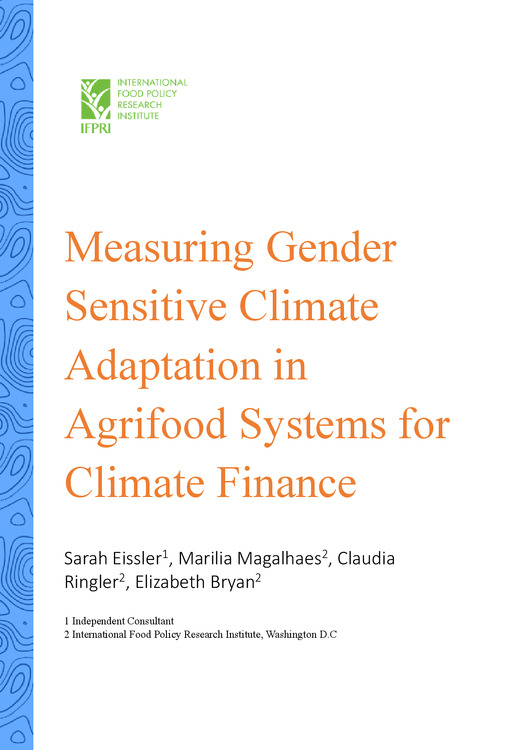
Brief
Measuring gender sensitive climate adaptation in agrifood systems for climate finance
2025Eissler, Sarah; Magalhaes, Marilia; Ringler, Claudia; Bryan, Elizabeth
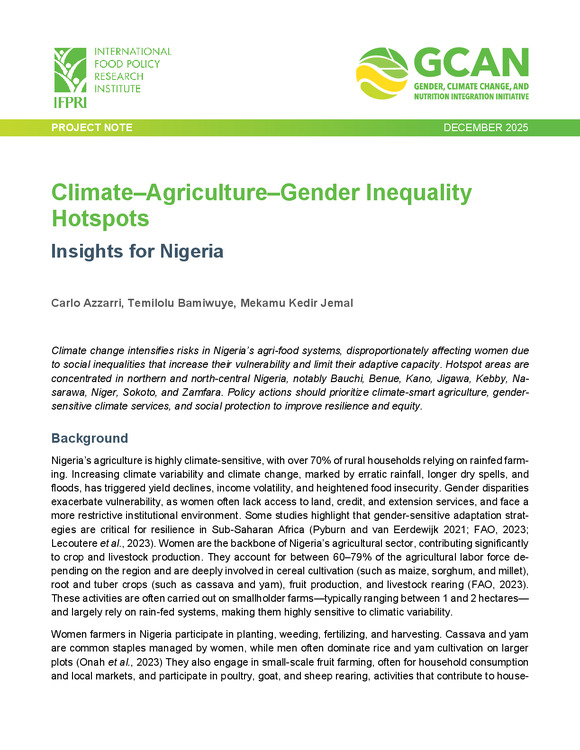
Brief
Climate–agriculture–gender inequality hotspots: Insights for Nigeria
2025Azzarri, Carlo; Bamiwuye, Temilolu; Kedir Jemal, Mekamu
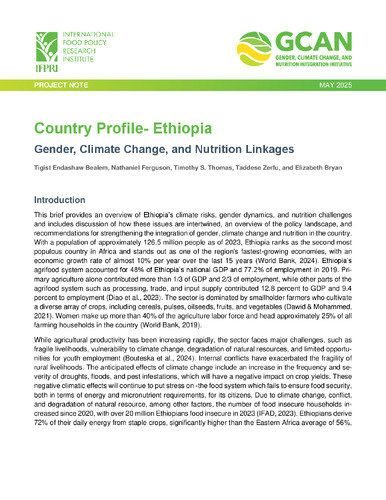
Brief
Country profile – Ethiopia: Gender, climate change, and nutrition linkages
2025Bealem, Tigist Endashaw; Ferguson, Nathaniel; Thomas, Timothy S.; Zerfu, Taddese Alemu; Bryan, Elizabeth
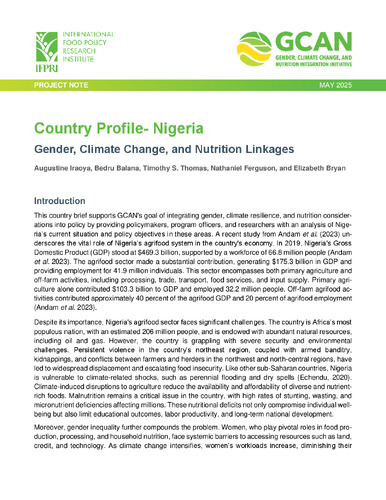
Brief
Country profile – Nigeria: Gender, climate change, and nutrition linkages
2025Iraoya, Augustine Okhale; Balana, Bedru; Thomas, Timothy S.; Ferguson, Nathaniel; Bryan, Elizabeth
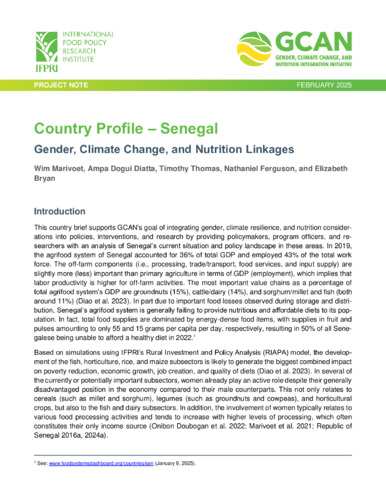
Brief
Country profile – Senegal: Gender, climate change, and nutrition linkages
2025Marivoet, Wim; Diatta, Ampa Dogui; Thomas, Timothy S.; Ferguson, Nathaniel; Bryan, Elizabeth
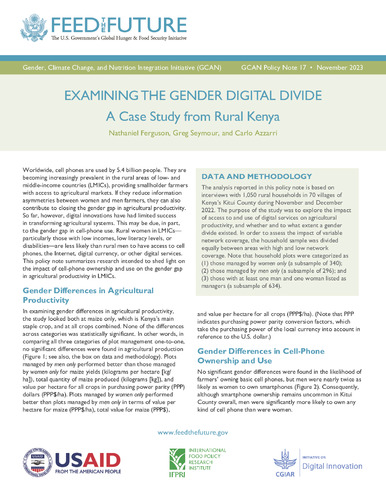
Brief
Examining the gender digital divide: A case study from rural Kenya
2023Ferguson, Nathaniel; Seymour, Greg; Azzarri, Carlo
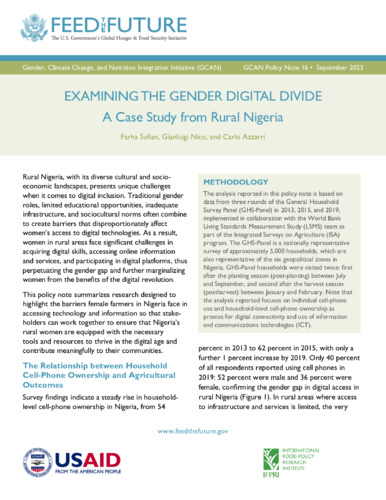
Brief
Examining the gender digital divide: A case study from rural Nigeria
2023Sufian, Farha D.; Nico, Gianluigi; Azzarri, Carlo
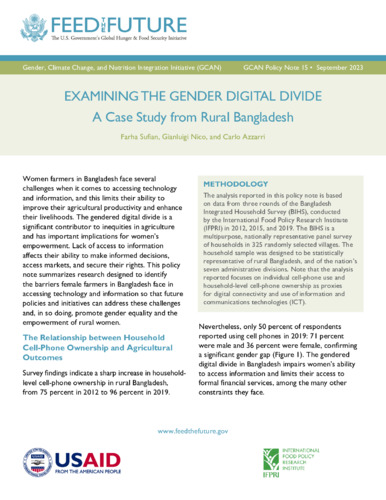
Brief
Examining the gender digital divide: A case study from rural Bangladesh
2023Sufian, Farha D.; Nico, Gianluigi; Azzarri, Carlo
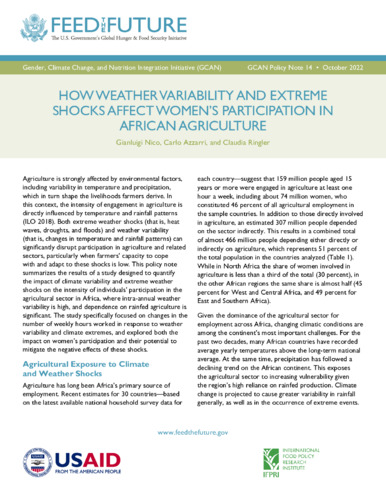
Brief
How weather variability and extreme shocks affect women's participation in African agriculture
2022Nico, Gianluigi; Azzarri, Carlo; Ringler, Claudia
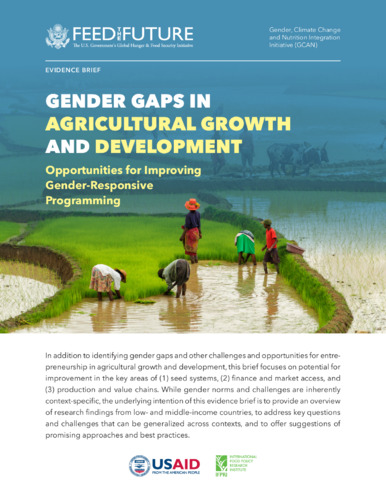
Brief
Gender gaps in agricultural growth and development: Opportunities for improving gender-responsive programming
2022Blackmore, Ivy; Ringler, Claudia; Meinzen-Dick, Ruth S.
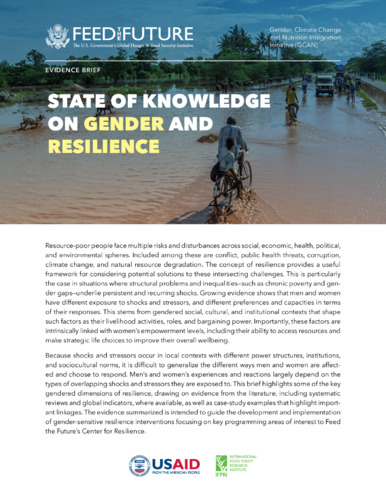
Brief
State of knowledge on gender and resilience
2022Bryan, Elizabeth
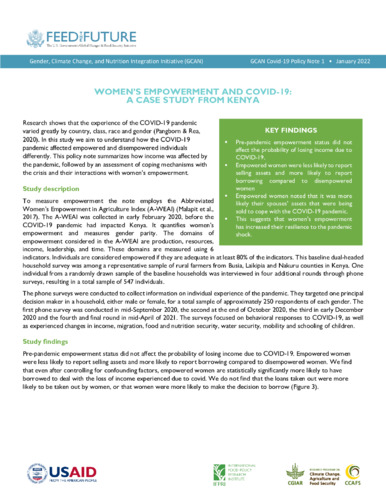
Brief
Women’s empowerment and COVID-19: A case study from Kenya
2022van Biljon, Chloe; Seymour, Greg
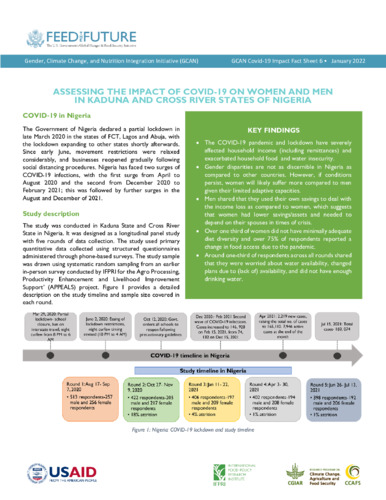
Brief
Assessing the impact of COVID-19 on women and men in Kaduna and Cross River states of Nigeria
2022Alvi, Muzna; Gupta, Shweta; Barooah, Prapti
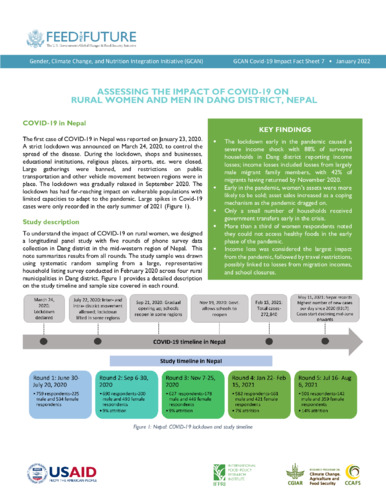
Brief
Assessing the impact of COVID-19 on rural women and men in Dang District, Nepal
2022Alvi, Muzna; Gupta, Shweta; Barooah, Prapti

Brief
Assessing the impact of COVID-19 on rural women and men in the Niger
2021Food and Agricultural Organization of the United Nations; United States Agency for International Development; International Food Policy Research Institute; Bryan, Elizabeth; Mawia, Harriet; Ringler, Claudia

Brief
Assessing the impact of COVID-19 on rural women and men in Kenya
2021Food and Agricultural Organization of the United Nations; United States Agency for International Development; International Food Policy Research Institute; Alvi, Muzna; Gupta, Shweta; Barooah, Prapti; Bryan, Elizabeth; Mawia, Harriet; Ringler, Claudia

Brief
Assessing the impact of COVID-19 on rural women and men in Uganda
2021Food and Agricultural Organization of the United Nations; United States Agency for International Development; International Food Policy Research Institute; Bryan, Elizabeth; Mawia, Harriet; Ringler, Claudia
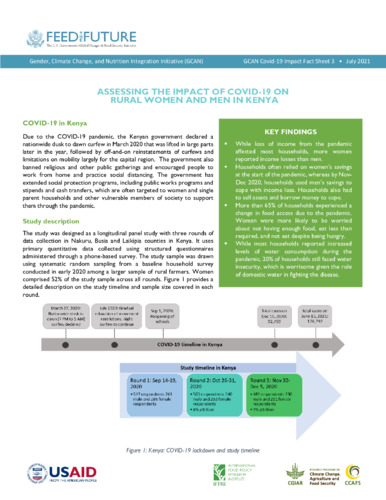
Brief
Assessing the impact of COVID-19 on rural women and men in Kenya
2021Alvi, Muzna; Gupta, Shweta; Barooah, Prapti
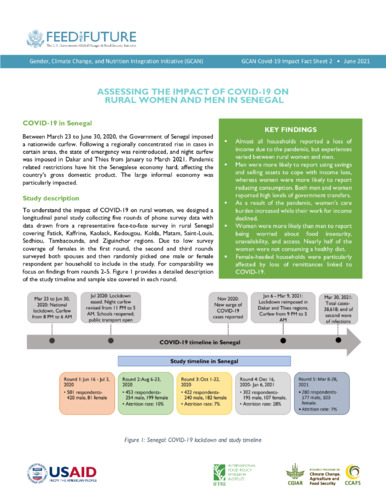
Brief
Assessing the impact of COVID-19 on rural women and men in Senegal
2021Alvi, Muzna; Gupta, Shweta; Barooah, Prapti
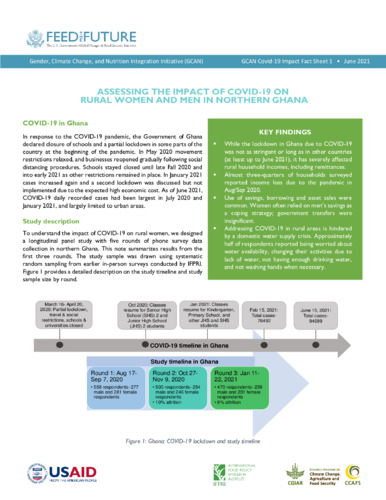
Brief
Assessing the impact of COVID-19 on rural women and men in northern Ghana
2021Alvi, Muzna; Gupta, Shweta; Barooah, Prapti
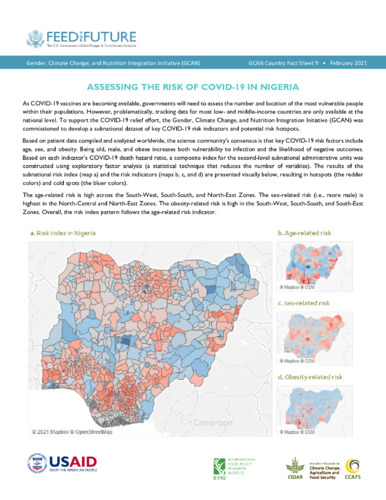
Brief
Assessing the risk of COVID-19 in Nigeria
2021Koo, Jawoo; Azzarri, Carlo; Ghosh, Aniruddha; Quabili, Wahid
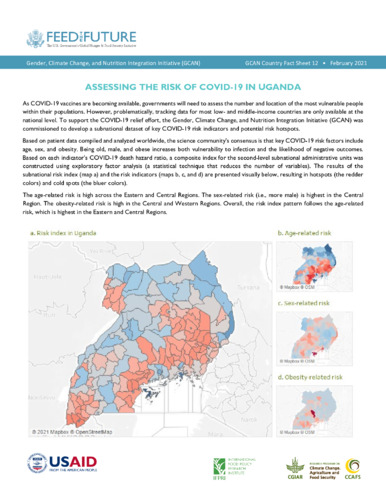
Brief
Assessing the risk of COVID-19 in Uganda
2021Koo, Jawoo; Azzarri, Carlo; Ghosh, Aniruddha; Quabili, Wahid
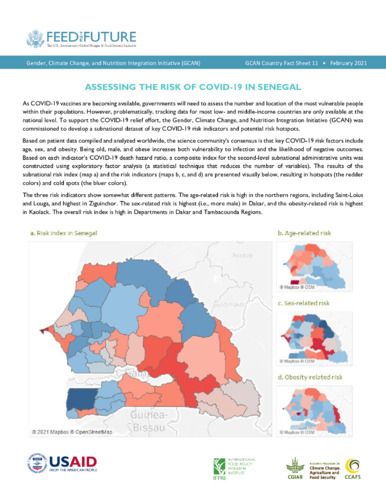
Brief
Assessing the risk of COVID-19 in Senegal
2021Koo, Jawoo; Azzarri, Carlo; Ghosh, Aniruddha; Quabili, Wahid
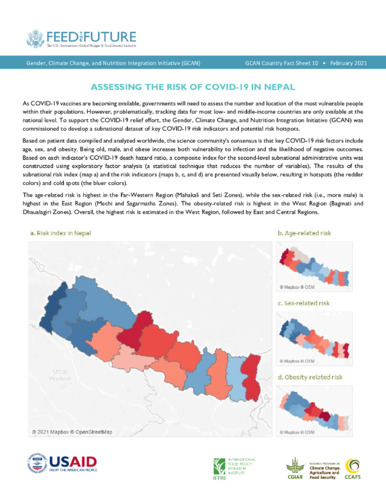
Brief
Assessing the risk of COVID-19 in Nepal
2021Koo, Jawoo; Azzarri, Carlo; Ghosh, Aniruddha; Quabili, Wahid
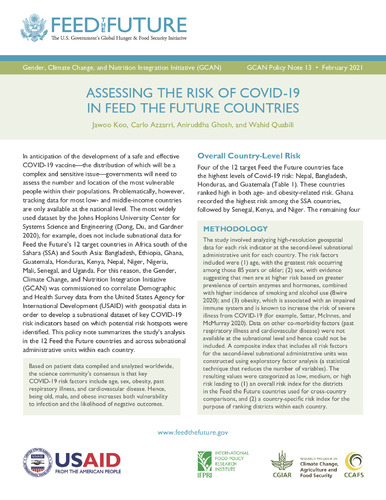
Brief
Assessing the risk of COVID-19 in Feed the Future countries
2021Koo, Jawoo; Azzarri, Carlo; Ghosh, Aniruddha; Quabili, Wahid
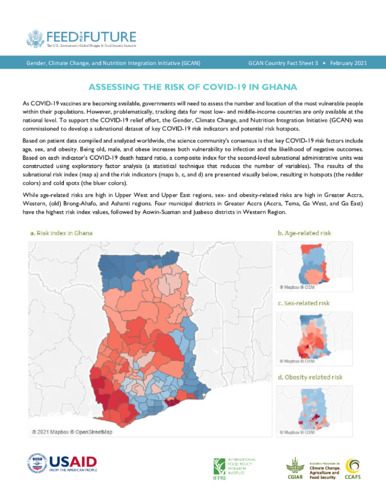
Brief
Assessing the risk of COVID-19 in Ghana
2021Koo, Jawoo; Azzarri, Carlo; Ghosh, Aniruddha; Quabili, Wahid
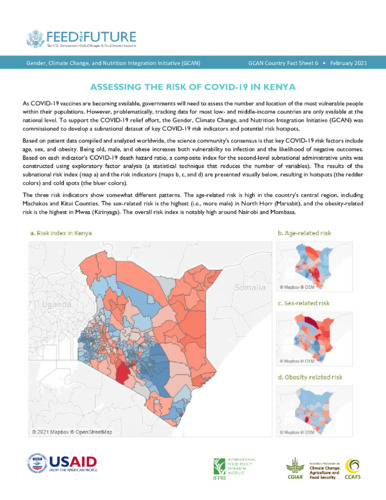
Brief
Assessing the risk of COVID-19 in Kenya
2021Koo, Jawoo; Azzarri, Carlo; Ghosh, Aniruddha; Quabili, Wahid
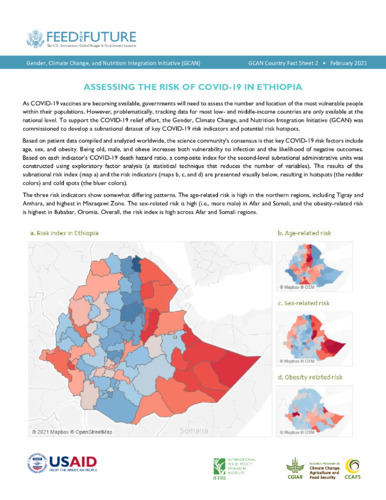
Brief
Assessing the risk of COVID-19 in Ethiopia
2021Koo, Jawoo; Azzarri, Carlo; Ghosh, Aniruddha; Quabili, Wahid
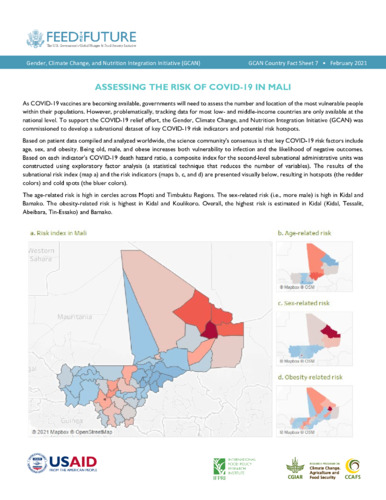
Brief
Assessing the risk of COVID-19 in Mali
2021Koo, Jawoo; Azzarri, Carlo; Ghosh, Aniruddha; Quabili, Wahid
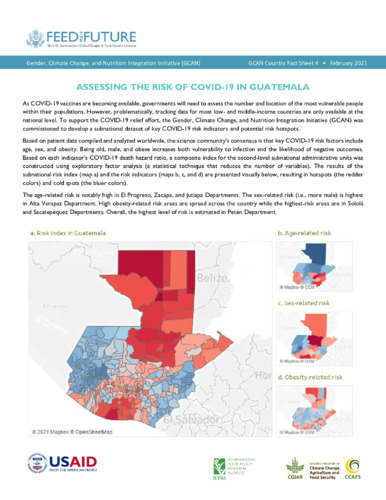
Brief
Assessing the risk of COVID-19 in Guatemala
2021Koo, Jawoo; Azzarri, Carlo; Ghosh, Aniruddha; Quabili, Wahid
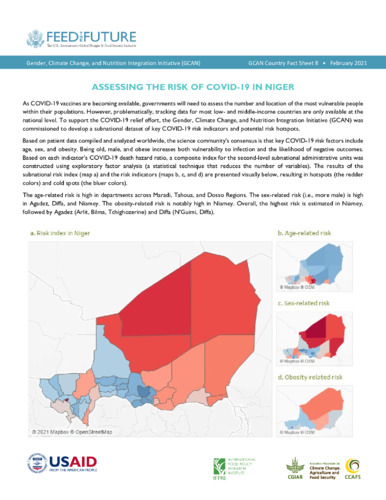
Brief
Assessing the risk of COVID-19 in Niger
2021Koo, Jawoo; Azzarri, Carlo; Ghosh, Aniruddha; Quabili, Wahid
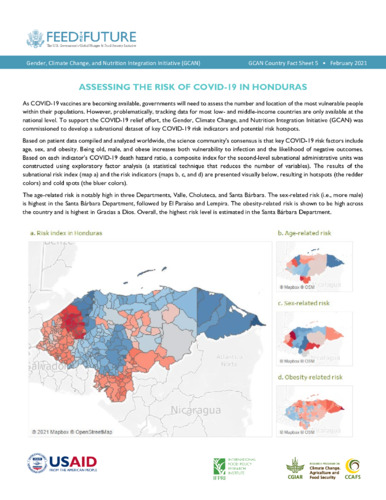
Brief
Assessing the risk of COVID-19 in Honduras
2021Koo, Jawoo; Azzarri, Carlo; Ghosh, Aniruddha; Quabili, Wahid
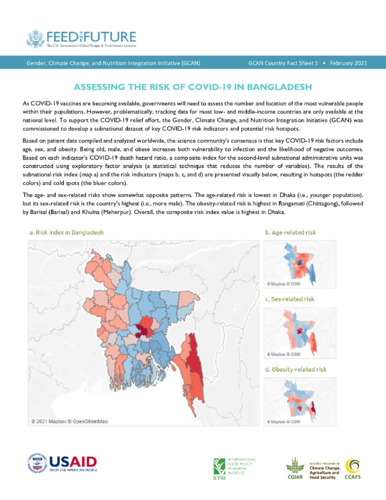
Brief
Assessing the risk of COVID-19 in Bangladesh
2021Koo, Jawoo; Azzarri, Carlo; Ghosh, Aniruddha; Quabili, Wahid
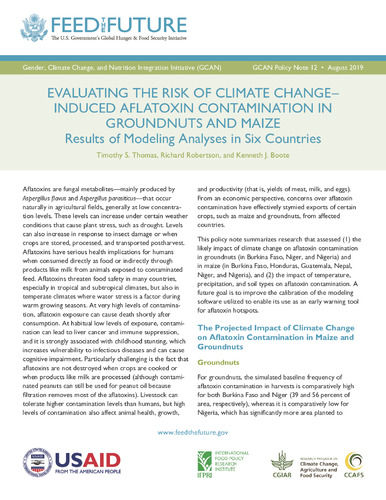
Brief
Evaluating the risk of climate change-induced aflatoxin contamination in groundnuts and maize: Result of modeling analyses in six countries
2019Thomas, Timothy S.; Robertson, Richard D.; Boote, Kenneth J.
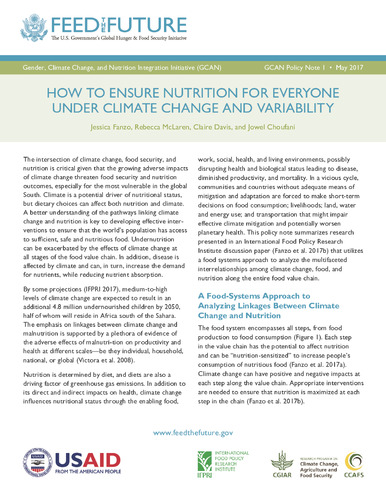
Brief
How to ensure nutrition for everyone under climate change and variability
2017Fanzo, Jessica; McLaren, Rebecca; Davis, Claire; Choufani, Jowel
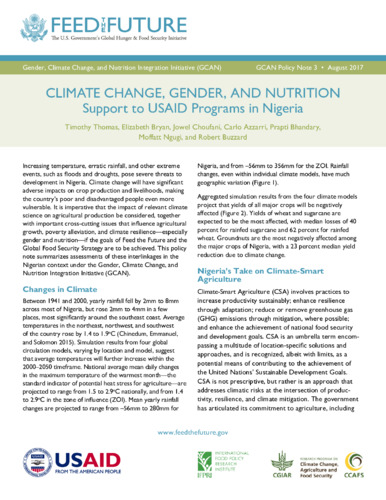
Brief
Climate change, gender, and nutrition: Support to USAID programs in Nigeria
2017Thomas, Timothy S.; Bryan, Elizabeth; Choufani, Jowel; Azzarri, Carlo; Bhandary, Prapti; Ngugi, Moffatt; Buzzard, Robert
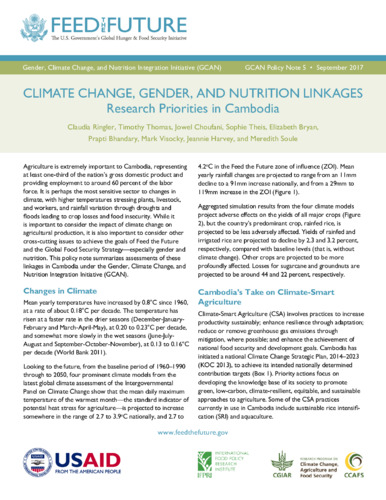
Brief
Climate change, gender, and nutrition linkages: Research priorities in Cambodia
2017Ringler, Claudia; Thomas, Timothy S.; Choufani, Jowel; Theis, Sophie; Bryan, Elizabeth; Bhandary, Prapti; Visocky, Mark; Harvey, Jeannie; Soule, Meredith
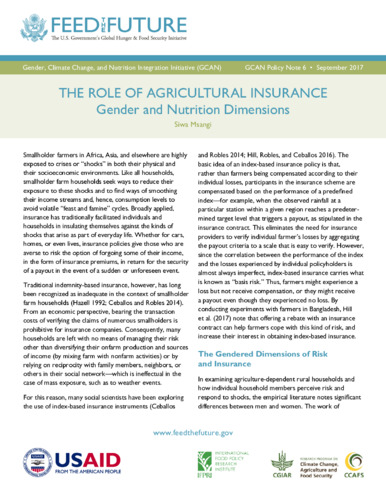
Brief
The role of agricultural insurance: Gender and nutrition dimensions
2017Msangi, Siwa
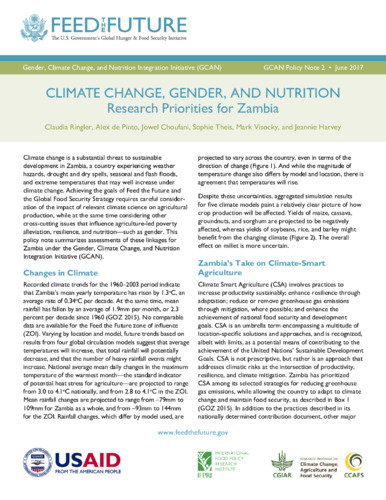
Brief
Climate change, gender, and nutrition linkages: Research priorities for Zambia
2017Ringler, Claudia; De Pinto, Alessandro; Choufani, Jowel; Theis, Sophie; Visocky, Mark; Harvey, Jeannie
1 to
10
of 39

